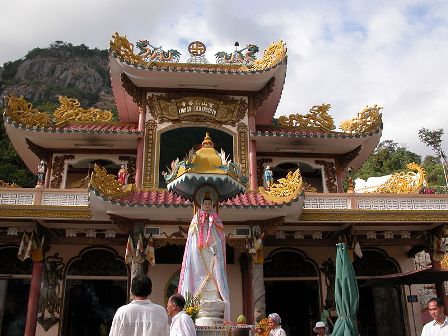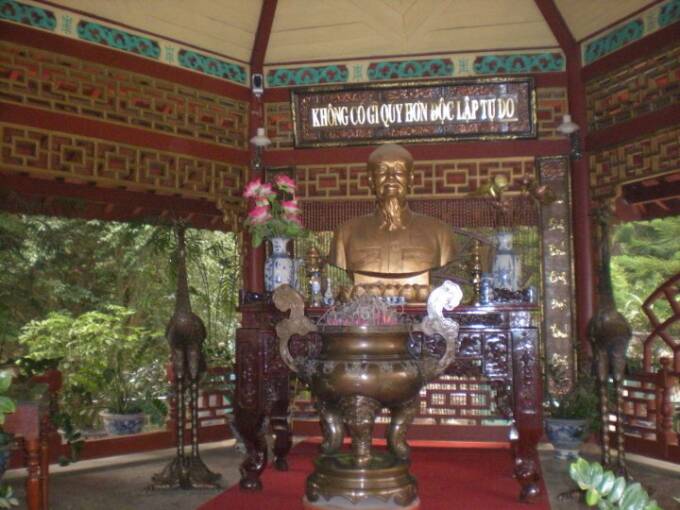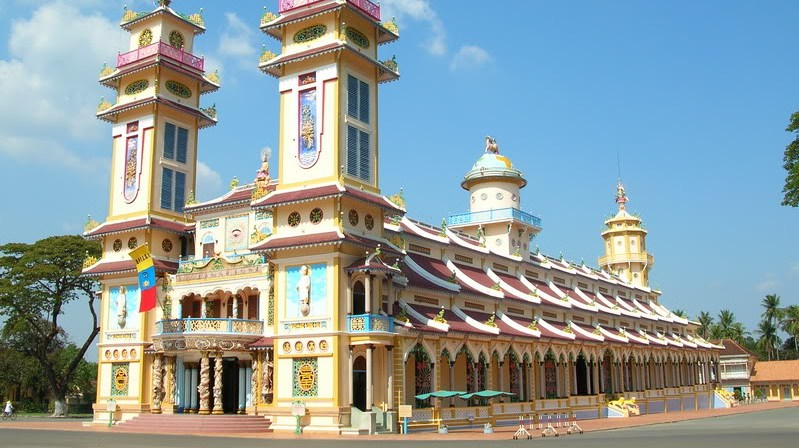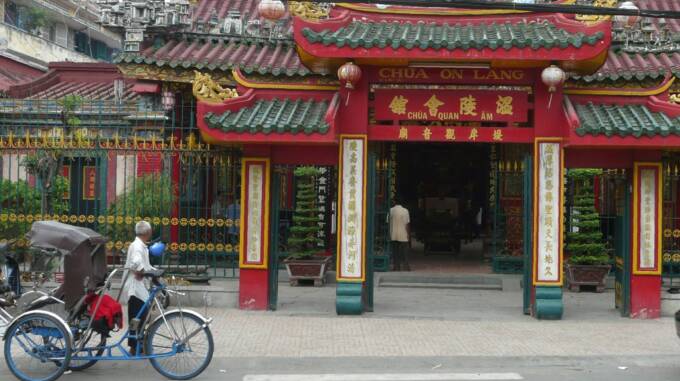Home > Vietnam > Vietnamese Religions
VIETNAM RELIGION
The earliest established religions in Vietnam are Mahayana Buddhism, Confucianism, and Daoism (called the "triple religion" or tam giáo). Significant minorities of adherents to Roman Catholicism, Cao Dai, and Hoa Hao and smaller minorities of adherents to Protestantism, Islam, Hinduism, and Theravada Buddhism were established later, in recent centuries. The majority of Vietnamese people classify themselves as non-religious, although they visit religious temples several times every year. Their everyday behaviours and attitudes are dictated by the synthesis of philosophies which can be traced from many religions, copy at www.vietnambiketours.com, especially Mahayana Buddhism, Confucianism, and Daoism. Those religions have been co-existing in the country for centuries and mixed perfectly with the Vietnamese tradition of worshiping their ancestors and national heroes. That special mix explains why the people there find it hard to say exactly which religion they belong to.
Religious freedom The Constitution of the Socialist Republic of Vietnam formally allows religious freedom. In 2007, Viet Nam News reported that Viet Nam has six religions recognised by the State: (Buddhism, Catholicism, Protestantism, Islam, Cao Dai, and Hoa Hao), copy at www.vietnambiketours.com, but that the Baha’i Community of Viet Nam had been awarded a "certificate of operation" from the Government’s Committee for Religious Affairs. The Committee for Religious Affairs was reported to have recently granted operation registration certificates to three new religions and a religious sect in addition to six existing religions. Every citizen is declared to be allowed to freely follow no, one, or more religions, practice religion without violating the law, be treated equally regardless of their religion, be protected from being violated in their religious freedom, but is prohibited to use religion to violate the law.
In fact, there are some limitations in religious practice in Vietnam. Foreign missionaries legally are not allowed to proselytize or perform religious activities. No other religions than those 8 are allowed to propagate. Preachers and religious associations are prohibited to use religion to propagate ideologies that violate the Communist government. copy at www.vietnambiketours.com, Many Vietnamese preachers who fled for America and other countries say that they were suppressed by the Communist government with no or unreasonable reason. However, legal preachers and religious associations working in Vietnam today are aided and honored by the government. It is still a controversy because some Vietnamese living in their hometowns don't recognize any violation in their religious lives while the foreign observers do.
Vietnamese government has been criticized for its religious violations mostly by the United States, the Vatican, and among overseas Vietnamese who oppose the Communist government. However, due to recent improvements in liberty of religion, the United States no longer considers Vietnam a Country of Particular Concern. The Vatican has also considered negotiations with Vietnam about freedom for Vietnamese Catholics. Despite some substantial tries by the Vietnamese Government to improve its international image and ease resrictions on religious freedom, the cases of dissident religious leaders persecution did not stop in the last years. The general secretary of the Mennonite Church in Vietnam and religious freedom advocate Nguyen Hong Quang was arrested in 2004, copy at www.vietnambiketours.com, and his house razed to the ground . Christian Montagnards and their house churches continue to suffer from state control and restrictions. In March, 2007, a member of the main Hanoi congregation of the legally-recognized Evangelical Church of Vietnam (North) Nguyen Van Dai was arrested for accusations relating to his defense of religious freedom, including disseminating alleged "infractions" of religious liberty.
Buddhism Of Vietnam's many religions, Buddhism is the most popular, about 85% of Vietnamese identify with Buddhism (all sects) even though they do not practice on a regular basis but the census of Government showed that only over 10 million people (or over 10% of the total population) have taken refuge in the Three Jewels. There are two types copy at www.vietnambiketours.com, of Buddhism found in Vietnam, Mahayana Buddhism and Theravada. Mahayana Buddhism first spread from China to Vietnam's Red River Delta region around 300 BC and remains popularly followed throughout the whole country, whereas Theravada Buddhism arrived from India into the southern Mekong Delta region between 300-600 AD and remains commonly adhered to in only the south delta area of Vietnam. To this day, Mahayana Buddhism is largely affiliated with the majority ethnic Vietnamese.
As communism began to rise in Vietnam, the regime generally avoided going against Buddhism but began to actively suppress any other religion. Instead, they declared that all Buddhists supported the new communist regime, in order to reduce the power of influential Buddhists that did not encourage communism, such as the United Buddhist Church of Vietnam. copy at www.vietnambiketours.com, The Communist government also forced nuns and monks to live a materialistic life as well as to work in agricultural labor and join the Patriotic Buddhist Liaison Committee. If they refused, they were placed under house arrest or imprisoned, and their pagodas and possessions were taken for public use. The government also prohibited Buddhist organizations from creating schools to train new monks and nuns. By April 1980, most of the Buddhist organizations were fully controlled by the government. Because of this, Buddhist rituals and practices relatively decreased and most pagodas were eliminated.
Roman Catholicism Roman Catholicism first entered Vietnam through catholic missionaries in 16th century and strengthened its influence when Vietnam was a French colony. The French encouraged the spread of the religion as they thought it balanced Buddhism and supported Western culture. Jesuit missionary Alexandre De Rhodes created in 17th century a written system of Vietnamese language largely using the Roman alphabet - it is used today and now called Quốc Ngữ (national language).
By the time the Communists had risen to power in Vietnam, monks and nuns were forced to work in agriculture, though the government officials claimed that they allowed the Catholics to continually practice their religion. copy at www.vietnambiketours.com, By November 1977, the government declared religious freedom for the Catholics in the Constitution of the Socialist Republic of Vietnam, but under the condition that all Catholic organizations must be under the control of the Communist government. In the 1980s, the Unified Bishops' Council of Vietnam and Committee for Solidarity of Patriotic Catholics were established to encourage Vietnam Catholics to support the Communist regime.
Cao Dai and Hoa Hao Cao Dai and Hoa Hao are minority religions in Vietnam that were both founded in the Mekong River Delta during the 19th century. Cao Dai is a type of reformed Buddhism with principles taken from Confucianism, Taoism, and Christianity that became popular in the rural regions of the southern delta area whereas Hao Hao is related closer to tradition Buddhism and became popular in the southernmost areas of the delta. As the communist regime fought for power, most of the Cao Dai and Hao Hao organizations tried to remain neutral throughout the conflict. However, by 1975, the Communist government (as they did to the Roman Catholics and Buddhists) began to pressure all Cao Dai and Hao Hao organizations to join the Communist cause.
Protestantism Present estimates of the number of Protestants range from the official government figure of 500,000 to claims by churches of 1 million. The two officially recognized Protestant churches are the Southern Evangelical Church of Vietnam (SECV), recognized in 2001, and the smaller Evangelical Church of Vietnam North (ECVN), recognized since 1963. copy at www.vietnambiketours.com, The SECV had affiliated churches in the southern provinces of the country. By some estimates, the growth of Protestant believers in Vietnam has been as much as 600 percent over the past ten years. Some of the new converts belong to unregistered evangelical house churches. Based on believers' estimates, two-thirds of Protestants were members of ethnic minorities (montagnards). Because Protestantism is closely associated with the United States, Protestants have been continually prosecuted by the Communist government, even to a greater extent than that of the Catholics
Islam Adherence to Islam in Vietnam is primarily associated with the Cham ethnic minority, although there is also a Muslim population of mixed ethnic origins, also known as Cham, or Cham Muslims, in the southwest (Mekong Delta) of the country.





